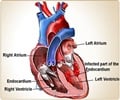Thomas Jefferson University researchers have identified a novel signaling pathway that can be a potential target for heart failure therapy.
The pathway plays a significant role in the production of aldosterone, a hormone that promotes heart failure after a myocardial infarction.Aldosterone production is mediated by a protein called beta-arrestin-1. Aldosterone is secreted by the adrenal cortex and its levels are elevated in chronic heart failure.
Its presence contributes to morbidity and mortality of the disease.
According to Anastasios Lymperopoulos, Ph.D., the production of aldosterone was previously thought to be solely the result of the activation of G-proteins.
"The bottom line is that in order to effectively suppress aldosterone production, you need to inhibit beta-arrestin-1 in addition to inhibiting G-proteins," said Lymperopoulos.
Walter Koch, Ph.D., the W.W. Smith Professor of Medicine and the Director of the Center for Translational Medicine and the George Zallie and Family Laboratory for Cardiovascular Gene Therapy, said that the findings clearly indicate beta-arrestin1 plays a more significant role in aldosterone secretion than G-proteins.
Advertisement
"It may not be independent of G-proteins, but beta-arrestin-1 is definitely the critical player.
Advertisement
The study appears in Proceedings of the National Academy of Sciences.
Source-ANI
ARU/M














